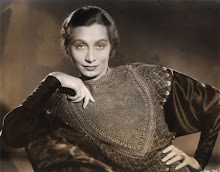.jpg)

I purchased this long forgotten book primarily for its film section, but retained it for other reasons. The years have not been kind; the exterior has not worn well. The book's purpose was to tell those who were away at war what happened while they were gone. It was published in 1946, the same year that
The Best Years of Our Lives opened across the country.
Might Millie have bought a copy for Al Stephenson? -- Perhaps. Or might Uncle Butch have recommended it to Homer over a beer at Butch’s? I think not. And we can be certain that Marie did not have a copy waiting for Fred Derry. Nor much else.
It is often said that the first casualty of war is truth. Yet casualties take many forms, large and small, as Wolcott Gibbs tells us. He was the drama critic, the movie critic, and a general editor for The New Yorker magazine. He knew, as one might expect, how to set the stage:
“Toward the end of November, 1941, the producing firm of Jose Ferrer and Ruth Wilk hopefully announced the opening of a play by Lowell Barrington called The Admiral Had a Wife. The date set was Wednesday, December 10, the theatre was the Playhouse, and the stars were Uta Hagen, Mr. Ferrer's wife, and Alfred Drake, a young actor soon to ride to glory in Oklahoma!
According to reports from out of town, the piece was a comedy, dealing with an ambitious navy wife in Hawaii and her efforts to obtain promotion for her husband through the influence of an uncle, agreeably potent in Washington; it was further described as “a good-natured spoof on the Navy," which, it seemed, was humorously honeycombed with nepotism.
On Sunday, the seventh, the Japanese bombers, swarming in over Diamond Head to blast Pearl Harbor and Hickham Field, scored an unplanned but nevertheless disastrous hit on the Playhouse, some five thousand miles away. The nautical spoof was hastily abandoned by her crew on Monday, the eighth, going down in theatrical history as the first local casualty of the war.
In addition to winning this unhappy distinction, it also marked the beginning of a period of unprecedented confusion, anxiety, makeshift, bad taste, and just plain nonsense on the American stage.”
A personal postscript by GP: Jose Ferrer had also cast Red Buttons to be in the play. Later in his career, Mr. Buttons (who did not shoot Lincoln) would tell audiences that the Japanese would do anything to keep him off Broadway.
Sayonara Broadway, so to speak.

Al Bernstein once said “Spring being a tough act to follow, God created June.” Well, Bosley Crowther’s film coverage of the war years has the disadvantage of closely following Wolcott Gibbs assessment of theatre in the same volume. But Mr. Crowther is no June -- he is deep winter. Granted, it is difficult to summarize approximately four years of films in 21 pages. And he succumbs. He gives us a boring litany, little insight, and a smattering of statistics. Mr. Crowther brings as much passion to his task as the waitress (Janet Shaw) at the
‘Til-Two does to hers. You remember her. She waited on Charlie and Uncle Charlie in
Shadow of a Doubt. A reader might be better advised to bypass Mr. Crowther’s contribution and read Mr. Gibb’s piece twice.

.jpg)





